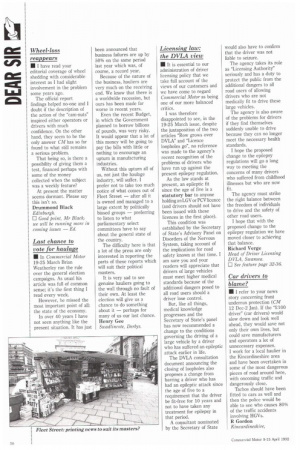Licensing law: the DVLA view
Page 52

If you've noticed an error in this article please click here to report it so we can fix it.
• It is essential to our administration of driver licensing policy that we take full account of the views of our customers and we have come to regard Commercial Motor as being one of our more balanced critics.
I was therefore disappointed to see, in the 19-25 March issue, despite the juxtaposition of the two articles "Row grows over DVLA" and "Licence loopholes go", no reference was made to the agency's recent recognition of the problems of drivers who have run up against the present epilepsy regulation.
As the law stands at present, an epileptic fit since the age of five is a statutory bar to anyone holding an LGV or PCV licence (and drivers should not have been issued with these licences in the first place).
This condition was established by the Secretary of State's Advisory Panel on Disorders of the Nervous System, taking account of the implications for road safety known at that time. I am sure you and your readers will appreciate that drivers of large vehicles must meet higher medical standards because of the additional dangers posed to all road users should a driver lose control.
But, like all things, medical knowledge progresses and the Secretary of State's panel has now recommended a change to the conditions governing the driving of a large vehicle by a driver who has suffered an epileptic attack earlier in life.
The DVLA consultation document announcing the closing of loopholes also proposes a change from barring a driver who has had an epileptic attack since the age of five to a requirement that the driver be fit-free for 10 years and not to have taken any treatment for epilepsy in that period.
A consultant nominated by the Secretary of State would also have to confirm that the driver was not liable to seizure.
The agency takes its role as "Licensing Authority" seriously and has a duty to protect the public from the additional dangers to all road users of allowing drivers who are not medically fit to drive these large vehicles.
The agency is also aware of the problems for drivers if they find themselves suddenly unable to drive because they can no longer meet the necessary health standards.
I hope the proposed change to the epilepsy regulations will go a long way to meeting the concerns of many drivers who suffered from childhood illnesses but who are now fit.
The agency must strike the right balance between the freedom of individuals to drive and the safety of other road users.
I hope that with the proposed change to the epilepsy regulation we have moved closer to achieving that balance.
Richard Verge
Head of Driver Licensing DVLA, Swansea.
0 See feature page 32-36.




























































































